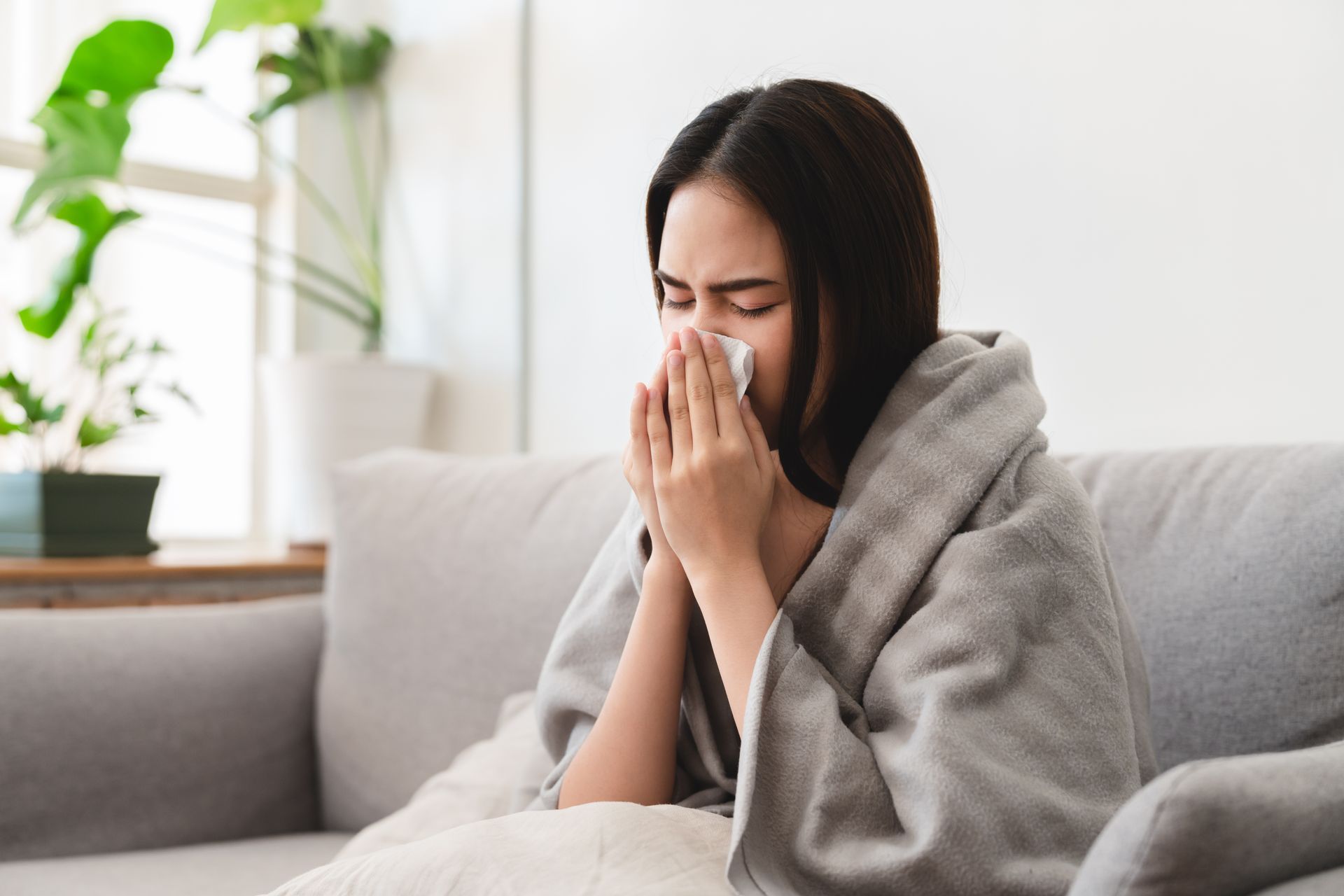Flu Season Safety: Tips for Shielding Your Family from Influenza

The Centers for Disease Control and Prevention (CDC) estimated that, between 2010 and 2020, influenza caused 9–41 million illnesses and 12,000–52,000 deaths annually.
Thinking of these numbers as the flu season returns can make anyone anxious. There’s no better time to arm yourself with the knowledge to shield your loved ones from the flu and also learn how to prevent colds. Recognize the signs and causes, find flu contact precautions, and learn how to fight the flu—all from this comprehensive blog.
Defining Influenza
Influenza, commonly known as the flu, is a communicable respiratory virus infection. Illnesses of this type tend to arise more frequently in wintertime. The influenza virus is well-known for its ease of transmission via airborne droplets. When an infected person sneezes, coughs, or talks, they spread tiny droplets containing the virus, which other people can touch or breathe in.
The Causes of Influenza
The first step in protecting your family from the flu is knowing what causes it. You can get the flu from the following:
A. Influenza A and B Viruses
The two main viruses, influenza A and B, cause seasonal flu. These viruses have various subtypes and strains that circulate yearly.
B. Antigenic Variation
One key challenge in dealing with the flu is the virus's ability to undergo antigenic variation. This means the virus's surface proteins change over time, making it difficult for our immune system to recognize and combat new variants.
C. Seasonal Epidemics
Influenza viruses are responsible for seasonal epidemics during fall and winter. Temperature and indoor crowding are the key factors in this recurring surge of infections.
The virus easily spreads from person to person through coughing, sneezing, or even just talking. Additionally, touching virus-contaminated surfaces and then touching your (or anyone’s) face can lead to infection.
The Flu Symptoms
Recognizing flu symptoms is beneficial in preventing complications. Learning to treat the flu as soon as possible can help achieve this goal effectively. Watch out for the following signs:
- Common Symptoms: Influenza presents many symptoms, including sore throat, fever, cough, runny or stuffy nose, and body aches. These vary in severity from person to person.
- Headache and Chills: Many individuals with the flu experience additional symptoms such as headaches, chills, and fatigue. These symptoms contribute to the overall discomfort of the illness.
- Gastrointestinal Symptoms: While not as common as respiratory symptoms, some people with the flu experience gastrointestinal issues such as diarrhea and vomiting. These symptoms are more prevalent in children.
- Variability in Fever: Although fever is a hallmark symptom of the flu, not everyone will have it. Some individuals may have mild or no fever while experiencing other flu symptoms.
Tips for Prevention: How to Stay Healthy During Flu Season
Since the flu can quickly spread from one person to another and has no cure, prevention is your most effective approach. Implement the following safety measures:
1. Get Vaccinated
Prevention for influenza starts with annual flu vaccinations. This is one of the most effective ways to prevent the flu. Vaccination reduces your risk of infection and helps protect those around you, especially vulnerable individuals like infants and older adults.
2. Maintain Healthy Hygiene Habits
Encourage regular handwashing with soap and water for at least 20 seconds, especially after coughing or sneezing and before eating. When you cough or sneeze, cover your mouth and nose with a tissue, and then dispose of the tissue properly. If you don’t have tissues, you may shield your mouth and nose with your elbow, which you should sanitize afterward.
3. Boost Your Immunity: Natural Ways to Prevent Flu and Colds
Your best defense is living a healthy life. The best way to keep your immune system running well is to follow general rules for good health. Every part of your body, especially your immune system, works better when you practice healthy life habits. For starters, aim to:
Stop smoking- Get enough sleep
- Exercise daily
- Maintain a healthy weight
- Eat more fruits and veggies
Read more: 5 Tips for Supporting a Healthy Immune System.
4. Stay Healthy During Flu Season
In the quest to ward off the flu, there are good habits to develop and practices to prepare yourself and your living space for the flu season. The prevention of influenza includes the following:
Keep your living spaces clean and well-ventilated to reduce the concentration of germs.- Avoid tapping your face, especially your eyes, nose, and mouth, as this could introduce viruses into your system.
- Wear a mask to help lower your risk of exposure in busy or dangerous places.
Read: Fueling The Family: Establishing Family Routines for Health and Wellness
5. Early Detection
Early recognition of flu symptoms is essential for prompt medical intervention. Early treatment helps reduce the severity and period of the illness and prevent complications, especially in high-risk individuals.
Fighting the Flu: What to Do When Infection Strikes
If prevention fails, there are effective ways to fight the infection and recover fully. Here's what you and your family must do if you already have the flu:
1. See Your Doctor
If you or a family member show flu-like symptoms, seek your doctor to acquire an antiviral prescription. These medications are more effective when administered early on during the infection.
2. Apply Home Care
Most people who get sick with the flu, especially those with mild cases, can recover well at home. Make sure to:
Rest: Allow your body to heal with plenty of rest.- Hydrate Yourself: Drink fluids to stay hydrated and relieve symptoms.
- Get Over-the-Counter (OTC) Medications: OTCs, like paracetamol and ibuprofen, help manage fever, pain, and congestion.
3. Practice Isolation
During flu season, practicing flu contact precautions becomes essential. It is necessary to isolate infected individuals to avoid spreading the virus.
Frequently Asked Questions (FAQs) on Influenza
Can we get vaccinated if we have an egg allergy?
Answer: Yes. Those allergic to eggs should still receive vaccines if they are otherwise healthy, even if the vaccines contain eggs. Starting with the 2023–2024 flu season, people who are allergic to eggs won't need to take any extra steps to stay safe when getting a flu shot, even if they've had a bad reaction to eggs in the past. This is true, no matter how inadequate the response was.
Will getting the flu shot make us sick?
Answer: No. The flu shot comes from an inactivated virus that does not transmit infection.
How long does the flu usually last?
Answer: Flu symptoms generally occur within days after infection. Within a week, most people will feel better. However, cough and fatigue will last for two weeks.
Powering Through the Flu Season: Strengthening Family Health
If you’ve made it here, you now have the tools and know-how to navigate flu season successfully. Embrace these practices, stay vigilant, and prioritize your family's well-being. Remember, it's not just about flu prevention; it's about nurturing a healthier and happier family for years.
Prioritize your family's well-being this flu season—schedule a visit to Houston Family Practice. Search for "best things for the flu clinic" and "doctors that prevent the flu" to find us. Our experienced team is here to provide comprehensive care and keep your loved ones healthy through the challenges of flu season.
To make an appointment with us today, call 713-520-6016 or click this
link. Act now to protect your family's health.











